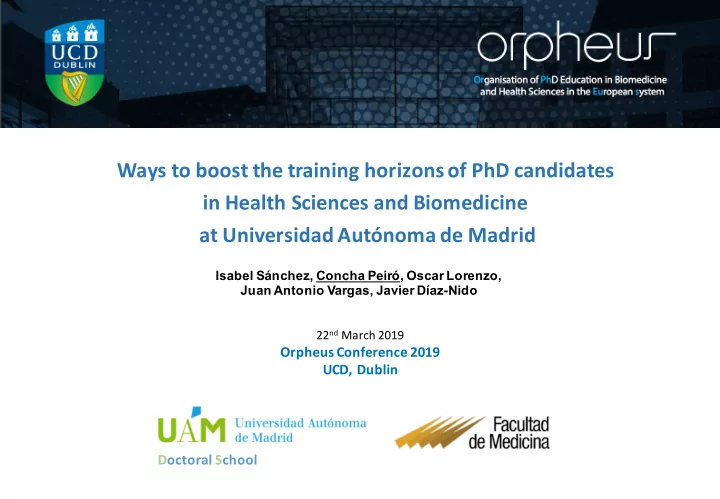

Ways to boost the training horizons of PhD candidates in Health Sciences and Biomedicine at Universidad Autónoma de Madrid Isabel Sánchez, Concha Peiró, Oscar Lorenzo, Juan Antonio Vargas, Javier Díaz-Nido 22 nd March 2019 Orpheus Conference 2019 UCD, Dublin Doctoral School
Outline I. Universidad Autónoma de Madrid and the Doctoral School II. The PhD Programs in Health Sciences & Biomedicine III. Activities to broaden the PhD candidates horizons
Universidad Autónoma de Madrid Founded in 1968 • Research-based University • Ranking: 22 nd (Europe) * • Total students: 30,394 • 8 Faculties/Schools + Doctoral School • Campus de Cantoblanco 2 Campuses • Campus de Medicina *THE
The Doctoral School • Established in 2016 • 35 PhD Programmes • 3,751 PhD Candidates (high proportion of doctoral candidates) PhD Candidates Theses Social enrolled (2018-19) (2017-18) Health Sciences Sciences & Sciences Law Arts & Humanities 632 (16.9%) 39 (11.1%) Sciences 1078 (28.8%) 141 (40.2%) Health Sciences 1192 (31.8%) 114 (32.47%) Art and Engineering/ Social Sciences & 768 (20.5%) 49 (14.0%) Architecture Humanities Law Engineering 81 (2.2%) 8 (2.3%) TotalUAM 3751 351 Doctoral School + Associated external Institutions
PhD Programmes in Health Sciences and Biomedicine 6 PhD Programmes • PhD Candidates enrolled: 1,636* • 46.3% 53.7% • External Institutions: CSIC (Science Research Council) • Pharmacology Molecular Neuroscience and Biosciences Physiology National research centers • Health research institutes of first-line hospitals • Medicine Clinical and Epidemiology (Madrid health system) Health and and Public Health Psychology Surgery** • Other Doctoral School * 2017-2018 **includes a research line in Nursing
Organization of PhD studies Initial Research Evaluation Evaluation Evaluation Evaluation Evaluation Proposal Thesis defence Year 1 Year 2 Year 3 (Year 4) (Year 5) MSc (oral open session) Degree Extension (>240 ECTS) + TRAINING ACTIVITIES PhD Award Acquisition of: Subject-specific skills • Transferable skills •
http://eurodoc.net/skills-report-2018.pdf Highly and broadly skilled • professionals Enhance competitiveness • Better employability •
Research training activities: knowledge beyond your own research subject "read more, listen more, see more and write more" • Research Seminars Spanish/ English Methodologicalcourses • Feedback from: Other students • Other supervisors •
Research training activities: knowledge beyond your own research subject 1st PhD Research Symposium in Health Sciences and Biomedicine ( One-day event) 12 from bench to bedside thematicsessions • Interactive lecture: • 5 Ways to keep Attention When Presenting Dr. G- Sánchez Prieto Best communications awards •
Research training activities: communications skills 1st PhD Research Symposium in Health Sciences and Biomedicine Written & Oral Communication Prepare concise and logically-written materials • Synthesis • Organize and communicate ideas effectively • Defend results/argumentation • Abstract book Interaction With candidates from the same or other disciplines • Basic-clinical researchers • (more options for translational research) With postdocs/senior researchers • (exploring future paths) Organization/management skills
Dealing with research methodologies and current challenges in science Course on “Methodologies and Contemporary Problems in Scientific Research” Over 1 academic year, 4 ECTS • What is is research? What is a theory? • How is knowledge generated? • Writing and evaluation of scientific proposal • Assessment of scientific production • Economy in Science • Artificial inteligence/ Big data • Social networks • Innovation and transfer of knowledge
Career Development 56 % increase in the number of new doctorates from 2000 to 2012* • Non academic > academic paths after obtaining a PhD • Career Workshop “Holding a PhD beyond academia” (April 3rd 2019) • Providing selected examples of non-academic careers • Strategies for exploring alternate careers Topics • Strategies for transitioning from inside to outside academia • Networking/ use of social networks *EUA-CDE 2019 Survey
Internationalization & Mobility • Personal and professional development • Language skills improvement Benefits • Opportunities for career prospect/exploring future options • Establishing/reinforcing international collaborations • Networking Foreign language Co-tutelle agreements programmes (English) (min 6 mo. mobility) Actions International Mentoring Mobility: short stays abroad Programs - International label (11.4%) - Funding schemes: Other
Next steps and challenges To fill the gaps for improving our specific and cross-sectional training offer • To further promote internationalization • To prepare high-skilled knowledge professionals with better employability options
Recommend
More recommend